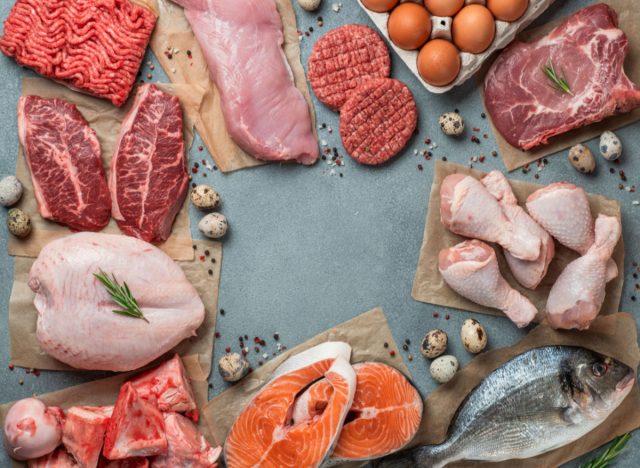15 Worst Daily Habits That Wreck Your Heart Health

Striving to keep your heart as healthy as it can be is a goal to work toward each and every day. After all, developing heart-healthy habits is crucial for your overall well-being. For instance, according to the Heart Foundation, regular exercise can decrease your chances of suffering from a heart attack or heart disease. Eating a diet full of antioxidants, whole grains, fiber, and healthy fats can boost your heart health as well. But just as much as it’s important to know what you should do, it’s also key to be in the know of what you shouldn’t do. We spoke with Elizabeth Klodas, MD, FACC, a board-certified cardiologist, author, speaker, and the founder and chief medical officer of Step One Foods, who breaks down some of the worst daily habits for your heart health.
It’s time to show your heart some extra TLC and make sure none of the below habits are part of your routine. Keep reading to learn what Dr. Klodas has to say about the worst daily habits for your heart health. And when you’re finished, be sure to check out these 4 Heart-Healthy Foods a Cardiologist Eats.
Ordering takeout

Let’s be honest: Ordering takeout is a real treat—especially when you don’t feel like cooking and just want to kick back and relax with some Netflix. In fact, it may be something you do daily for lunch or dinner. But keep in mind the next time you reach for your go-to takeout menu that these foods are usually jam-packed with sodium and calories, Dr. Klodas notes. They’re also low in important nutrients such as healthy fats, whole food fiber, and antioxidants.
Focusing too much on protein

Protein is a key component of any healthy diet. However, according to Dr. Klodas, “Concentrated sources are typically animal-based (meat, dairy) and these typically come with saturated fats which are counterproductive to cholesterol control and heart health in general.”
As a matter of fact, according to a study performed by researchers at Harvard T.H. Chan School of Public Health, consuming large amounts of four main saturated fatty acids—which are found in red meat—can increase your risk of developing coronary heart disease.
Having too much screen time

You may be surprised to find screen time on this list of the worst daily habits for your heart health. But your time kicking back binge-watching your favorite shows or working long days without taking breaks to get up and move is time you’re physically inactive. “[This habit] adds to inactivity which is another major risk factor for heart disease,” Dr. Klodas tells us.
The current Physical Activity Guidelines for Americans recommends adults get 150 minutes of moderately intense physical activity, along with two days of muscle-strengthening exercise, on a weekly basis. So find creative ways you can add more movement to your day, and establish workouts you genuinely enjoy (and will stick with).
Not flossing your teeth

If you’re guilty of this bad habit, you’re certainly not alone. “Oral health has been consistently linked to heart health,” Dr. Klodas explains. “Individuals with poor oral hygiene are at higher risk of experiencing heart events.”
One study published in the Journal of Periodontal Research revealed that using dental floss is linked to a decreased risk of new cardiovascular events among individuals who have coronary heart disease. So start flossing, and keep it up!
Drinking your fruits

Not only is fruit juice something dietitians warn against if you want to keep your weight in check, but it can also contribute to poor heart health. “Because they are devoid of the pulp and fibrous components, fruit juices are mostly concentrated delivery systems for sugar,” Dr. Klodas tells us. “Foods that deliver sugar in concentrated or added forms help you gain weight and raise your cholesterol levels.”
Loading up on caffeine throughout the day

Your cups of joe may be a highly anticipated part of your daily ritual, but you may want to consider cutting back. Loading up on too much caffeine throughout the day can backfire when it comes to your heart health. “Caffeine in excess can contribute to high blood pressure readings and even rhythm abnormalities in susceptible individuals,” Dr. Klodas says.
Salting your food first

Put the salt shaker down! Salting your food without trying it first is a bad habit to ditch. “Excess sodium is highly prevalent,” says Dr. Klodas. “It’s also a major contributor to elevated blood pressure readings.”
Putting things off until tomorrow

Procrastinating can get the best of us at times, but prioritizing your heart health is not something you should ever put off until tomorrow. “We don’t get to repeat today,” Dr. Klodas stresses. “Every day that goes by without us prioritizing our heart health is a day that helps build heart disease.”
Snacking

Reaching for the snack drawer when you feel like munching can be all too easy. That’s why it’s time to reevaluate the snacks you have in your arsenal and make sure you have the healthiest options at the ready for when the hunger kicks in.
“Unless your snacks are fresh fruits and vegetables, your snacking is likely counterproductive to health,” Dr. Klodas explains. “An extra 100 calories per day is 10 lbs in a year. An extra 250 milligrams of sodium is a cup of salt over the course of a year.”
Drinking alcohol

Don’t overdo it with the wine pours. “Although there is some data around alcohol being beneficial for heart health, much of this is older evidence that has been disputed over time,” Dr. Klodas tells us. “Drinking less is a good idea. Not drinking at all is probably best.”
If you indulge in a fun cocktail or your favorite blend of wine, the American Heart Association (AHA) stresses drinking in a moderate manner. The AHA recommends keeping it to one to two drinks for men and one drink for women per day.
Smoking

This bad habit speaks for itself; smoking is “one of the habits most consistently linked to the development of heart disease,” Dr. Klodas notes. The Centers for Disease Control and Prevention (CDC) reports that the life expectancy for individuals who smoke is a minimum of 10 years shorter than those who don’t smoke, which really puts things into perspective. In addition, if you ditch smoking before hitting 40, you can lower your risk of passing away from a smoking-related disease by around 90%.
Not eating your veggies

Vegetables may not be a top favorite for everyone, but incorporating them into your diet is beneficial for a multitude of reasons. “Vegetables are loaded with nutrients vital for heart health,” Dr. Klodas tells us. “They are also full of antioxidants which help keep our arteries healthy and resilient.” So add some of the best vegetables for your heart—such as spinach, tomatoes, asparagus, and Brussels sprouts—to your shopping list pronto.
Drinking diet soda

Diet or not, cracking open a can of soda and sipping to your heart’s content is toxic to your health. Soda is bursting with added sugars, which could lead to weight gain and obesity. “Non-nutritive sweeteners mess with your gut microbiome resulting in worse insulin sensitivity and disordered satiety signaling,” Dr. Klodas says. In addition, research shows soda can increase your chances of experiencing cardiovascular disease (CVD) events like stroke and coronary heart disease.
Ignoring the fact that you snore

If you snore, it’s time to check in with a healthcare professional and dig deeper into this nighttime habit. “Snoring can be a sign of sleep apnea, a condition that increases your risk of high blood pressure, pulmonary hypertension, and cardiovascular events,” Dr. Klodas says.
Thinking your family history of heart disease is your “destiny”

Your family history of heart disease doesn’t have to be your future. By following just the right healthy lifestyle habits on a regular basis, you are doing everything you can to take control of your own destiny.
“Genetics accounts for about 20% of heart disease risk,” Dr. Klodas explains. “We all have a lot of power over our health trajectories.”
- Source: https://www.hsph.harvard.edu/news/press-releases/saturated-fats-increased-heart-disease-risk/
- Source: https://pubmed.ncbi.nlm.nih.gov/24824149/
- Source: https://cpr.heart.org/en/news/2019/05/24/drinking-red-wine-for-heart-health-read-this-before-you-toast
- Source: https://www.ahajournals.org/doi/10.1161/JAHA.119.014883









